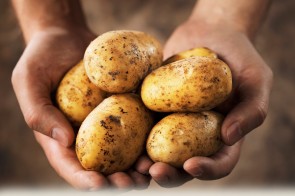Ryan Andrews is a principal nutritionist and adviser for Precision Nutrition and an adjunct instructor at Purchase College, State University of New York. He holds master’s degrees in both Nutrition and Exercise Physiology from Kent State University and a BS in Exercise Science from the University of Northern Colorado.
Andrews is also a Registered Dietitian (RD), Certified Strength and Conditioning Specialist (CSCS) through the National Strength & Conditioning Association (NSCA), a certified exercise physiologist (ACSM), and a Registered Yoga Teacher (RYT).
He frequently writes and speaks about nutrition, health, and sustainable food systems and has accumulated over 1000 hours volunteering at organic farms and with non-profit food recovery organizations.
Articles by Ryan Andrews, MS, MA, RD, RYT, CSCS

All About Genetic Testing and Nutrition
Our different genotypes account for our differing nutritional needs and food sensitivities. In theory, genetic screening holds promise as a tool for fine-tuning individual diets. But for now, it’s still an often costly and error-prone procedure that may not provide the answers we want.

Infant nutrition:
New parents are subjected to all kinds of contradictory advice about infant nutrition. But with a few simple guidelines – and some advice from PN parents – you can be sure that you are getting your infant off to the healthiest start.

All About Potatoes
While many people avoid potatoes due to fear of toxins or excessive weight gain, the humble spud, if stored and prepared with care, is a nutritious, delicious, and environmentally friendly food source that shouldn't be ignored.

All About Folates and Folic Acid
Folate deficiency is the most common vitamin deficiency in developed countries, contributing to serious health problems such as neural tube defects (NTD), megaloblastic anemia, digestive disorders, cardiovascular disease, mood disorders, and more. Supplementing with folic acid or folinic acid can reduce the risks associated with folate deficiency.

A grain of truth:
Against the grain? Ryan Andrews is not. In this article he outlines why he prefers to eat grains. And why, unless you're intolerant to grains, you might consider them too.

Forget calorie counting:
Math? To plan your dinner? Isn't there a better way? Yes there is: Just take a look at your hand. Use your fist, palm, cupped hand, and thumb to practice calorie control, while avoiding the hassle of counting calories. Check out Precision Nutrition's Calorie Control Guide for Men and Women.
All About Cell Phones & Health
Many factors contribute to the potential health risks of cell phones. Learn what they are, and how you can protect yourself.
All About Nutrition & Gut Health
Our gastrointestinal tracts work hard to keep us healthy and happy. When gut health is compromised, we can face major health consequences. Here's how to use good nutrition to keep your digestion humming along.
Mercury toxicity:
Mercury is a naturally occurring heavy metal, found throughout the environment, with many harmful health effects. In this article: Where mercury is found, what it does in our body, and how to avoid or treat mercury exposure.
Microwave cooking:
Many people in fitness are completely freaked out by microwave cooking. They're worried that the microwave destroys nutrients. Ruins food quality. Poisons our bodies. Are any of these claims true? Should we be worried about microwave cooking (or reheating)? In this article we'll find out the truth.
Side effects may include… leanness
Being lean shouldn't be an end to itself. Instead, it should be a "side effect" of a lean lifestyle. While this surprises a lot of people, here's a fundamental truth. How we live may be even more important than what we eat.
All About Honey & Bees
If you're looking for a local-source sweetener with some health benefits, try honey. Use honey sparingly, enjoying its antimicrobial and antioxidant properties, and thank the hard-working bees who brought it to you.
Fighting acne with food:
Acne is a multi-factorial disease. While each case is unique, you can greatly improve your chances of clear skin by eating whole foods; lowering inflammation and stress; getting a good fatty acid balance; and cutting down the worst offenders: wheat, sugar, and dairy.
All About Food Addiction
Many behaviors qualify as addictions -- things we feel overwhelmingly compelled to do, despite the consequences. What's food addiction, and how can we treat it?
All About The Squat
The squat is a basic human movement. Performing it makes you better at athletics, fitness, and life in general. Here's how.
Ryan Andrews, aka “Lunch Lady”
Coach Ryan Andrews spent 10 months as a school cafeteria worker. Here are 18 lessons he learned about food choice, food quality, and kids food education.

Resistant starch:
Resistant starch is a type of starch that isn’t fully broken down and absorbed, but rather turned into short-chain fatty acids by intestinal bacteria. This may lead to some unique health benefits. To get the most from resistant starch, choose whole, unprocessed sources of carbohydrate such as whole grains, fruits, vegetables, and beans/legumes.
All About Preserved Produce
If you think that frozen or canned veggies are a poor nutritional choice, think again. We all benefit from more veggies and fruits in our diet — and preserved plant foods can be a great option for busy people or consuming out-of-season produce.
9 questions for Jason Bonn
Lean Eating Coach Jason Bonn spent the last four months interning at Cressey Performance (CP) in Massachusetts. I figured he may have had a few decent experiences there, you know, considering it's one of the premier training facilities in the U.S. I caught up with him and had him answer nine questions about his experience.



Share